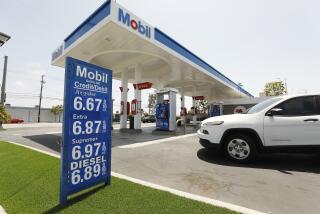Fuel Economy: a Shield Against New Oil Shocks
- Share via
Iraqi President Saddam Hussein’s naked act of aggression against Kuwait is also an act of economic aggression against the West.
OPEC had already agreed, at Hussein’s demand, to hike the price of oil by $5 per barrel. Americans will pay this “Hussein” tax, not only at the gas pump but with the reawakening of inflation. Every dollar’s rise in a barrel of oil translates into a nickel more per gallon at the pump.
America should take preventive action now, so that our economy will not be permanently held hostage to the vagaries of Middle-East politics. One constructive response is to improve automobile fuel performance.
In 1975, Congress enacted a Corporate Average Fuel Economy standard. This standard, known as CAFE, requires each auto manufacturer’s new-car fleet, overall, to meet certain fuel economy standards. Despite the industry’s dire warnings that the standards were impossible to meet, auto makers did comply, contributing to a dramatic improvement in auto mileage per gallon, with no loss of performance or interior room. As a result, billions of dollars did not go abroad to oil-producer bank accounts and billions of tons of carbon dioxide did not spew into our air.
The fuel-economy standard is now frozen at 27.5 mpg, a standard that was a worthy goal for the 70s and 80s. But our growing dependence on foreign oil and our environmental and economic problems now demand significant improvements. A goal of improving fuel efficiency by 40% by the end of the century is realistic. The Transportation Department estimates that such an improvement would save 49.1 billion gallons of gasoline, or more than 2 billion barrels of oil, in just its first year at that level.
The single best way to improve the existing CAFE legislation is to require auto manufacturers, both domestic and foreign, to achieve the same percentage improvement for cars sold in this country. The effect of this would be to prevent makers of primarily small cars, who may currently have a high miles-per-gallon average, from backsliding as they go into production of larger models. This approach would indeed require the automobile industry to change production plans, which are set several years in advance. But the legislation would allow phase-in time.
The breathing space of the 1980s was squandered in a false spring of inexpensive oil. Saddam Hussein’s barbarism reminds us that we may yet pay a heavy price for our inaction.






